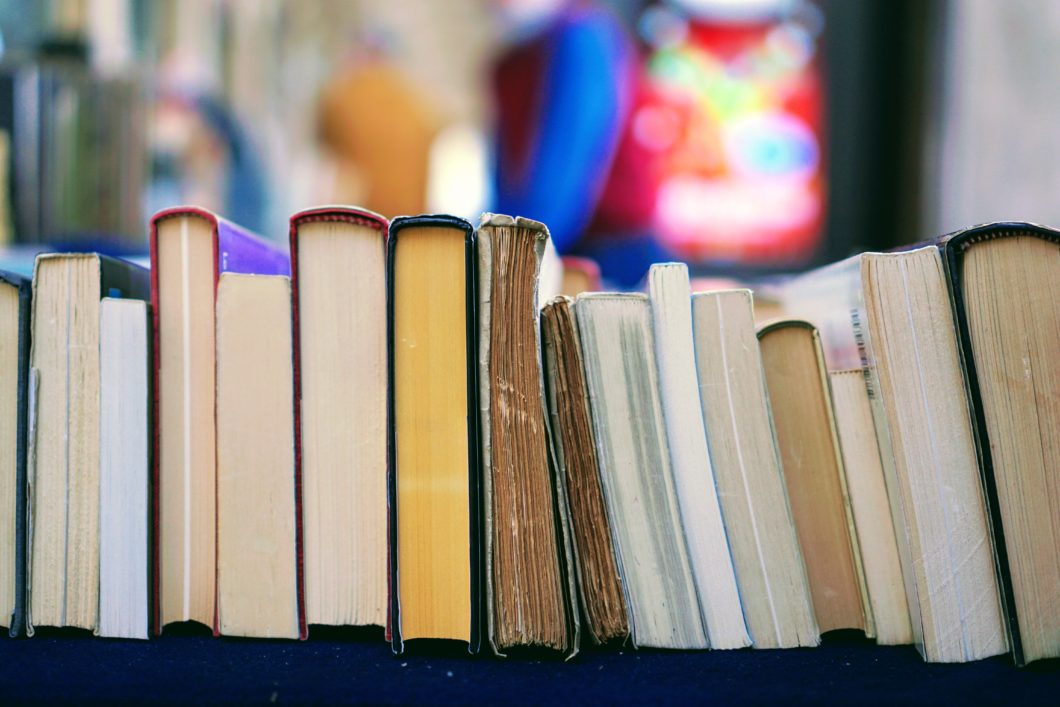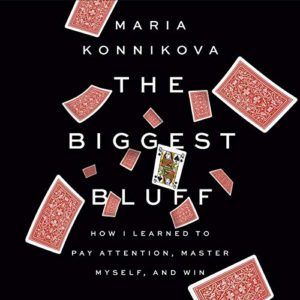The Following Post is a Guest Post by Reese Jones.
Cover Photo Credit: Tom Hermans/UniSplash
Table of Contents
Introduction
Playing competitive chess can be an exciting and rewarding experience — but it can also be extremely stressful, grueling, and tiresome. Studying in the solitude of your own home, traveling to the tournaments, and performing well under pressure are all extremely challenging and difficult tasks that can have a very big impact on your mental state. It is not surprising a number of chess players in the past (and present) have battled with some severe mental health problems.
Furthermore, it is not only about how much you study the game, but also – how you study the game. As we covered in our previous post ‘12 Types of Chess Players’ , a typical type of player nowadays is the memorizer/cyborg: the one who knows all the chess strategies by heart but doesn’t really know how to play the game. Understanding HOW to study a certain field – in this case, chess – can help you create a better study plan – and be more effective when it comes to executing it.
Last but not the least, traveling to the chess tournament inevitably involves the social aspect and interaction with other people. And, as mentioned in the afore-mentioned post, the people you meet in the chess circuit won’t always be pleasant, but it will be impossible to avoid them altogether – especially if you are about to play with them. This means having a certain set of tools that will help you navigate those tricky social interactions can be very beneficial.

Image Credit: UniSplash
This just goes to show that knowing how to play chess is more than just about having the best skills and having multiple strategies and theories down pat. If you are a serious chess player, learning best how to deal with the off-the-board events such as psychological attitude, approach to the game and the social aspect can help you become a stronger competitor – but also a more balanced and better person overall.
This is where reading non-chess books, apart from purely chess books, can come in handy. To help you become the best player and person you can be, in this article we’ve listed five books that can help you master yourself, find the right perspective, and strengthen your emotional maturity!
Hope you will enjoy it!
Best Non-Chess Books Every Chess Player Should Read
Atomic Habits by James Clear 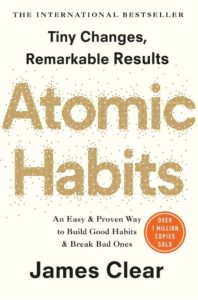
Selecting a list of only 5 books is an extremely difficult endeavor as it is almost impossible to select only 5 books out of all the instructive and wonderful books available out there.
But in the context of chess and chess players 1, one book definitely gets recommended more often than many others – mainly because its topic is of huge importance for someone who does a lot of studying from their own home and relies on self-discipline and control.
James Clear’s Atomic Habits is a straightforward book about holistic self-improvement that anybody can learn from from the world’s leading expert on the topic. Its thesis is simple: self-improvement relies on completing small and easy routines consistently. Repeat a habit enough times and it becomes automatic. By eliminating bad habits and establishing healthier ones, you can reach any goal you set your mind to.
Chess players can apply Clear’s advice to use repetition in a number of ways. For one, it can often be easy to become careless in chess. You might forget to analyze an opponent’s prior moves before acting, thus making it necessary to take drastic measures just to get back in the game. Repetition can help turn helpful exercises, such as practicing, reviewing games, and visualizing opponent moves, into instinctive habits.
At the same time, you can bring healthier habits into your everyday life. This can help you acknowledge that though improving at chess can be a long process, you shouldn’t forget to care for your own well-being along the way. As Clear states in the book:
“When you fall in love with the process rather than the product, you don’t have to wait to give yourself permission to be happy.”
P.S. If you want to find out more about James Clear and his expertise on the topic of habits, make sure to visit his blog
The 7 Habits of Highly Effective People by Stephen R. Covey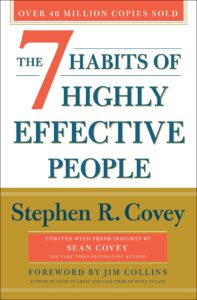
Like James Clear, Stephen R. Covey believes in the power of good habits. Though The 7 Habits of Highly Effective People focuses mostly on business settings it’s helpful for anybody who wishes to use habits to achieve a specific goal. This makes it unique from Atomic Habits, which solely discusses how to establish better routines. Habit number two is summed up with the handy quote: “Begin with the end in mind.” It’s particularly useful for chess players trying to improve as fast as they can.
First, define your goal. Would you like to be better at visualizing your opponent’s moves? Or do you simply wish to deepen your understanding of chess strategy? Since both you and your opponent will always have the same goal in mind for a game — to capture the other’s king — you may also be wanting to improve your defense strategy.
From here, it will be easier for you to outline how to achieve your goal or goals by aligning your actions toward it or them. This basically means you can better gauge whether watching past tournaments, practicing on your own or looking for a mentor will work best for you — and it can ultimately help you reach the end you have in mind faster.
The Art Of Learning by Josh Waitzkin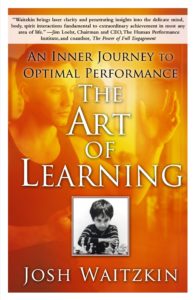
Renowned chess prodigy Josh Waitzkin was just nine years old when he won the National Chess Championship and became famous when the movie Searching For Bobby Fischer, 2 depicting his early years, was filmed. Many years later, Josh Waitzkin gave up chess and achieved world-class expertise in another field – becoming a titled Tai Chi World Champion.
To become the best at two drastically different disciplines, Waitzkin had to hone one specific skill: learning. Chess players can do the same by reading Waitzkin’s own book, The Art Of Learning. This autobiographical discussion tackles how one can build their expertise efficiently.
To do so, Waitzkin goes over a number of concepts. This includes how to adopt a growth mindset, an approach that believes dedication and hard work are all one needs to enhance their basic abilities. The book also covers how to make practice more deliberate. Deliberate practice is yet another approach that’s more systematic than the growth mindset. It espouses efforts toward improvement without immediate enjoyment and reward — but of course without eliminating them altogether. Above all, Waitzkin talks about how to mix discipline with love and how that can help you learn and push yourself closer to your learning goals. Waitzkin sums everything up like so:
“The key to pursuing excellence is to embrace an organic, long-term learning process, and not to live in a shell of static, safe mediocrity. Usually, growth comes at the expense of previous comfort or safety.”
The Biggest Bluff by Maria Konnikova
After a streak of bad luck, New Yorker writer and psychologist Maria Konnikova sought poker training from Poker Hall of Fame inductee Erik Seidel. Here, she hoped to learn how to navigate the occasionally unpleasant randomness of life.
Her experience with Seidel earned her trips to some of the most renowned poker tournaments, winnings worth $300,000, a book deal, and multiple life lessons. According to Konnikova, succeeding in anything requires making peace with the uncertain. That’s why even chess players can learn something from Konnikova’s poker-centric book, The Biggest Bluff. As Konnikova wrote:
“This book isn’t about how to play poker. It’s about how to play the world.”
Though the outcome of a chess game hinges exclusively on player decisions, there’s value in learning how to steel yourself against the unexpected: being matched with much stronger players at a tournament, contracting inconvenient illnesses before a big game, and so on. You have no say in the cards you’re dealt, but you do get to choose how you play them.
P.S. Maria Konnikova was also a guest on the Ladies Knight Podcast hosted by Jennifer Shahade. You can listen to the episode here.
Zen and The Art of Motorcycle Maintenance by Robert M. Pirsig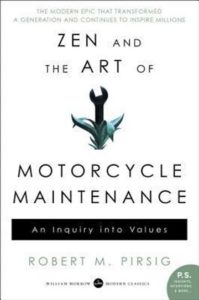
In 1968, Robert M. Pirsig and his son took a month-long road trip from Minnesota to San Francisco and back. Their journey became the inspiration for the profound philosophy lining Pirsig senior’s most acclaimed work, Zen and the Art of Motorcycle Maintenance.
What chess players can learn from Pirsig is the hard-to-define concept of quality: the blend between the rational and the subjective. Success, be it in chess or motorcycle maintenance, requires not just rational understanding but also a good attitude toward any rational problem.
Understanding chess concepts but entering games in a poor emotional state will make it difficult for you to apply your knowledge. Patience, on the other hand, will make all the difference: it can clear your mind, steady your hand, and make it easier for you to play chess to the best of your ability. In other words, it can enhance the quality of your game.
All chess players have limitless potential. Unlocking that potential is a matter of improving yourself beyond the game and working on things like perspectives, habits, and emotional control. Books like Atomic Habits, The 7 Habits of Highly Effective People, The Art of Learning, The Biggest Bluff, and Zen and The Art of Motorcycle Racing can help you reach your goals!
- and not only chess and chess players
- For more info about that movie and other chess references from the popular culture, please visit our previous post Chess In Popular Culture

